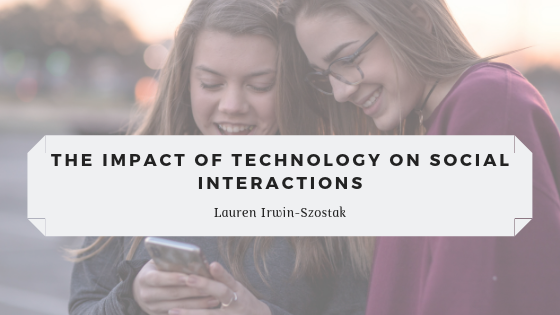Advances in technology over the past several decades have changed the way people work, communicate, and engage socially. While keeping up with new technological advances is challenging in itself, the speed at which technology has impacted the social sphere is both exciting and bewildering. Such advances have triggered an entirely new set of social expectations and customs. For example, receiving personal, hand-written letters has become a novelty, while electronic messaging has become normality. Such Messaging brings pressing expectations to constantly engage with friends and family throughout social media, texting or email.
Like many great revolutionary advancements, there have been major positive and negative shifts in the way we behave due to the growing relevance of technology in our everyday lives. Cell phones make it easy to stay in constant contact with family, friends, and associates. There is an abundance of knowledge at one’s fingertips, and remedial tasks have been innovated to be much more convenient. However, the claim that these technologies have on one’s time can be enormous. People are spending less time with one another face-to-face, and are more likely to reserve their interpersonal communications for messages, emails, and texting.
The quality of this type of communication, while enjoyable in the moment, can often become superficial. In-person interactions suffer when cell phones pose a distraction. Because of the abundance of possibilities that are now rooted within the devices in the palms of our hands, it can be difficult to look away from the screens, and look into the eyes of the people around us. It can be frustrating to converse with someone who can’t seem to put his or her cell phone down. Whenever an email needs checking, a text needs to be responded to, or a game needs to be resumed, real social interaction takes a backseat and relationships suffer.
While it is important to be aware of the negative effects that technology has brought upon our social realm, the immensely positive enhancements it has made cannot be overlooked. For example, long-distance relationships are much more easily maintained. Whether a good friend moved across the country or friendship with an individual in another part of the world blossomed online, personal connections with them can not only be sustained, but can be encouraged to flourish. Because of the incredible connectivity of the online world, relationships can thrive even with great distance between them.
There is a rising reliance on cell phones which poses a threat to intimate connection. People commonly remain tied to their phones 24 hours a day, checking messages, reading the news, and engaging with others through social media rather than face-to-face. Social media sites offer entries into online communities with opportunities to share interests and ideas. Of course, this can be widely beneficial to the education, development, and enlightenment of individuals; however, it cannot compete with in-person interactions, or meaningful connections with friends and family. Over time, the non-stop stimulation of electronic devices can become addictive. Many people struggle to spend time alone without continuous communication or technological stimulation. Often, the urge to stay in touch may be motivated more by fear of boredom than by the desire for meaningful interaction.
Technological advances have undoubtedly advanced social interactions in many ways. The rapid developments in technology, especially the advancement of smartphones, have revolutionized the way we see the world. Its existence is bewildering and magical, but can become debilitating with habitual indulgence.
Finding moderation is the key to healthily enjoying all the benefits that technology has to offer. Setting aside time to spend untethered from one’s electronic devices is critical in order to preserve a positive mentality. No matter how mystifying the world of technology may seem, man an effort to look someone in the eyes and experience the uninterrupted intimacy that is true personal interaction.






